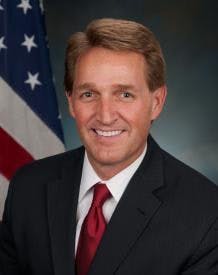A dose of Washington comes to CPhI in Chicago
Sen. Jeff Flake (R-Arizona)
During his keynote address to a packed auditorium inside CPhI North America in Chicago this April, it became clear that Sen. Jeff Flake (R-Arizona) is one of the last of a dying breed. While combative politics continue to create gridlock inside the nation’s capital, Flake has remained a rare stalwart of bipartisanship. Having served in Congress and the Senate for 18 years, Flake also offered historical insights into why Washington has become mired in partisan bickering.
Around the time Flake headed to Washington, he said it was common for legislators to live in D.C. and only return home for visits. Because politicians then spent more time together and got to know each other on a personal level, there was more trust and respect among the community of lawmakers.
“The level of trust that members of Congress have in each other has diminished because they don’t know each other,” he explained. “There’s an old saying that you’ll never question your colleague’s motives if you know the names of their children.”
All of that changed in the 90s, when lawmakers began staying in their home states more and commuting into D.C. when it was time to get to work.
“We’re in a pattern now where members of Congress are trying to pass legislation with a narrow majority and then overturn the other party’s legislation. It’s not a good pattern to be in,” Flake said.
Where do we go from here? When it comes to healthcare, Flake said that despite President Trump’s continued desire to “repeal and replace” the Affordable Care Act, Republicans generally sense they have lost ground on this issue. Although Flake predicted that there could still be efforts to repeal the “individual mandate” within the law that requires all Americans buy into the system, the general consensus now is that Republicans don’t want to look like they are against increased access to healthcare.
But one area where Republicans and Democrats have generally come together is on the issue of drug prices. Flake said he believes that the efforts to increase transparency for drug pricing will likely continue. But at the same time, lawmakers are aware that they don’t want to stymie drug development.
“Whatever we do, we have to maintain incentives that drive the private sector to create the wonder drugs we still need,” he said.
As Washington mulls different approaches to lowering prescription drug costs, Flake said he will continue pushing for bipartisan agreements that also include input from pharma industry trade associations, with an understanding that the business world banks on “stability and predictability.”
By working with these various stakeholders, Flake said that lawmakers are more likely to craft sensible legislation that doesn’t become vulnerable when the political pendulum swings a different direction.
“Legislation that endures is bipartisan,” he said.

